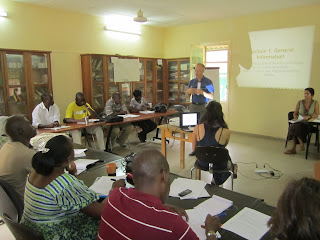At mid-service, there’s a changing of the guard or a passing of the baton,
of sorts, that happens with volunteers. Many
of the folks who were here when we arrived have just ended their service
and have gone home, moving my group up a notch in seniority, and new trainees have
arrived taking our place as the new kids on the block. It was difficult to say goodbye to the
friends I’d made here over the past year.
Living in harsh conditions and sharing our experiences with one another
creates a unique bond. Much of what goes on over here is hard to
explain to people not living in the midst of it. Part
of me felt a little abandoned when a handful of my friends left a couple of weeks ago and it made the 12 months
ahead of me feel a quite daunting. At
the same time, however, I was welcoming a new group of people who are just about to start their service and are so excited to
be here. They’re a good reminder of why
I came and what I hope to accomplish before I leave.
This seems as good a time as any to take my first vacation. Next week I’ll be meeting my parents in
Barcelona for a Mediterranean cruise. It
may seem extreme to go from roughing it in a developing world to fancy living
on the high seas, but I need it desperately, especially now at mid-service. A little booster will do me good and, hopefully, I’ll come back refreshed , ready
to take on new projects , and motivated to push a little harder on some
projects that have recently stalled. I timed this trip to coincide with
Ramadan, as things here tend to slow down then.
Ninety-four percent of the country are Muslims and therefore Ramadan
becomes all-consuming. People fast (no
food or water) from sunup until sundown (~5:30am ~7:30pm) which means things
begin to slow down around lunchtime when people roll out their mats. After that it’s
hard to get much done. Some volunteers
show their solidarity and fast with their families, however, I've decided to
spend this time recharging and regrouping. I’m totally at peace with that. Sometimes you need to listen to what your
body needs, like last week when I consumed 3 hard-boiled eggs, a bag of beef
jerky, and a can of tuna, including its juice, within a 3 hour window. Clearly, I needed a protein boost. Other times you need to listen to your soul
and mine is telling me I need to get away for a bit. Hopefully, this vacation will leave both my
body AND my soul a little more energized.
 |
| July 2011 - Past, current, and future PCVs from the Dakar region. |
Truth be told, I’m a little bit worried how I’ll handle
being in the developed world again. I’m
packing extra wraps because, even though I long to experience air conditioning
again, I’m sure I’m going to freeze on the ship and then there are the socially
questionable bad habits I’ve picked up since being here. In order to integrate into a new culture you
often find yourself doing what they do to try to fit in, but these don’t always
translate into social norms in other parts of the world. The following is a list of
10 habits that I should probably try to break before getting on my plane next
week:
- Burping during meals
- Wiping my nose on the hem of my skirt
- Flapping my arms like a chicken when I say “No”
- Eating my meals on the floor
- Wearing flip flops to formal events
- Slurping my drinks
- Scraping the filth beneath my fingernails with the page corners of the book I’m reading (ok, I admit, that one’s all me—no one reads here)
- Adding “Inchallah” (God willing) to the end of every sentence
- Letting insects crawl on my food while I’m eating
- Squatting wherever and whenever when I need to pee
Wish me luck with all of that!
While I’m gone, the volunteers in my area will be continuing to raise money for a Girls Leadership Camp that we’ve planned for the end of September. We’ve been working hard these past few months to coordinate this project. I’ve even been in discussions with NPR’s West African Correspondent, Ofeibea Quist-Arcton, to join our Career Day panel. Per Peace Corps policy, all funding for camps must be come through a Peace Corps Partnership Grant, which basically means that we have to solicit funding from people back home. So, if you’ve been looking for a way to support some of the work I’m doing over here, this would be your opportunity. One of the goals of this camp is to encourage girls with aptitude to continue their education, as this is a problem in Senegal. According to a recent gender assessment study done by USAID, the ratio of girls to boys drops from 98% in primary school, to 80% in middle school, and then to only 54% in high school. Girls are usually pulled out of school early to assist with household chores or later to get married. Our camp will focus on the importance of continuing their education, on the roles they can play in their society, and the opportunities that are available to them. We’ve got about 40 girls who are coming to camp, which is being held at a local university not far from my town. To donate to this project, follow this link: Thiès Region Girls Leadership Camp 2011.



